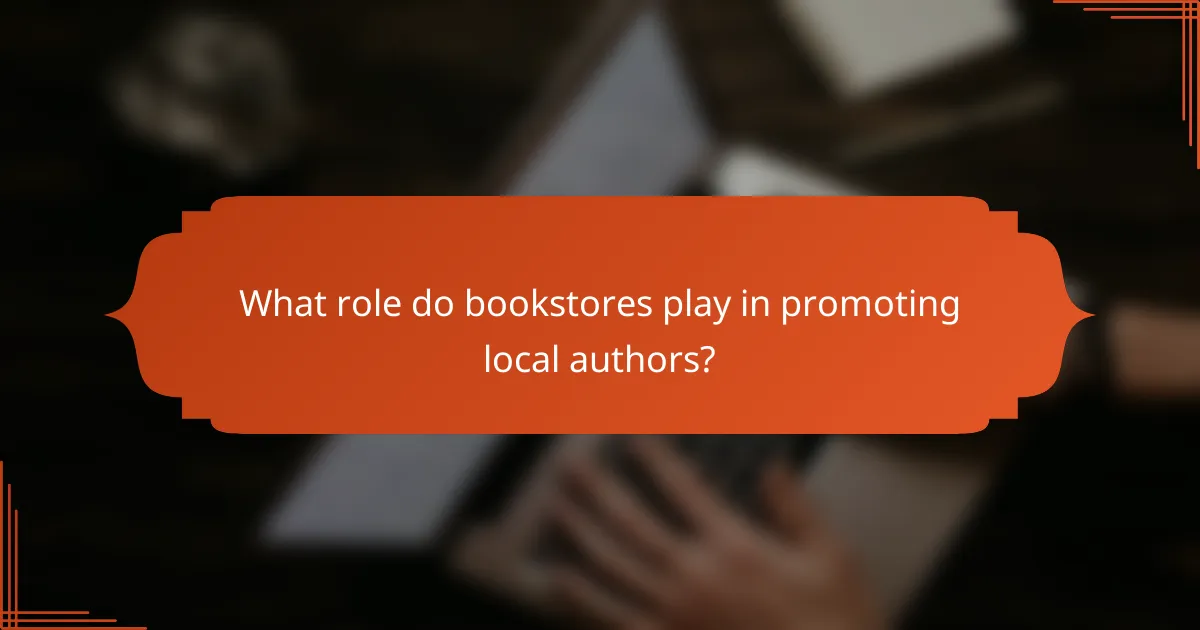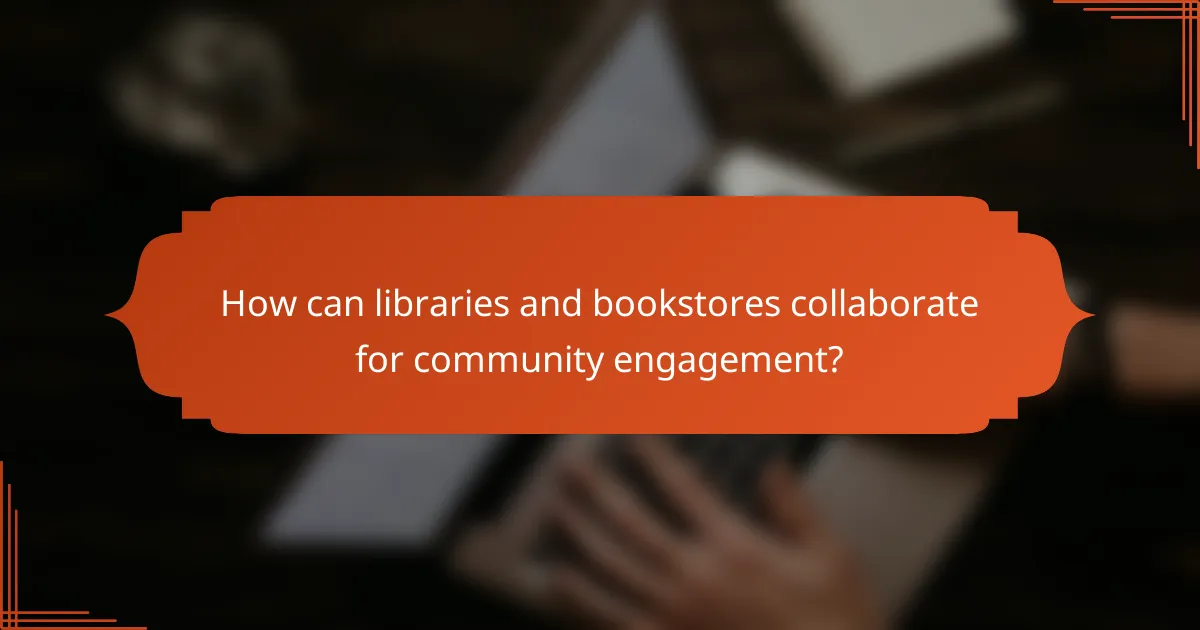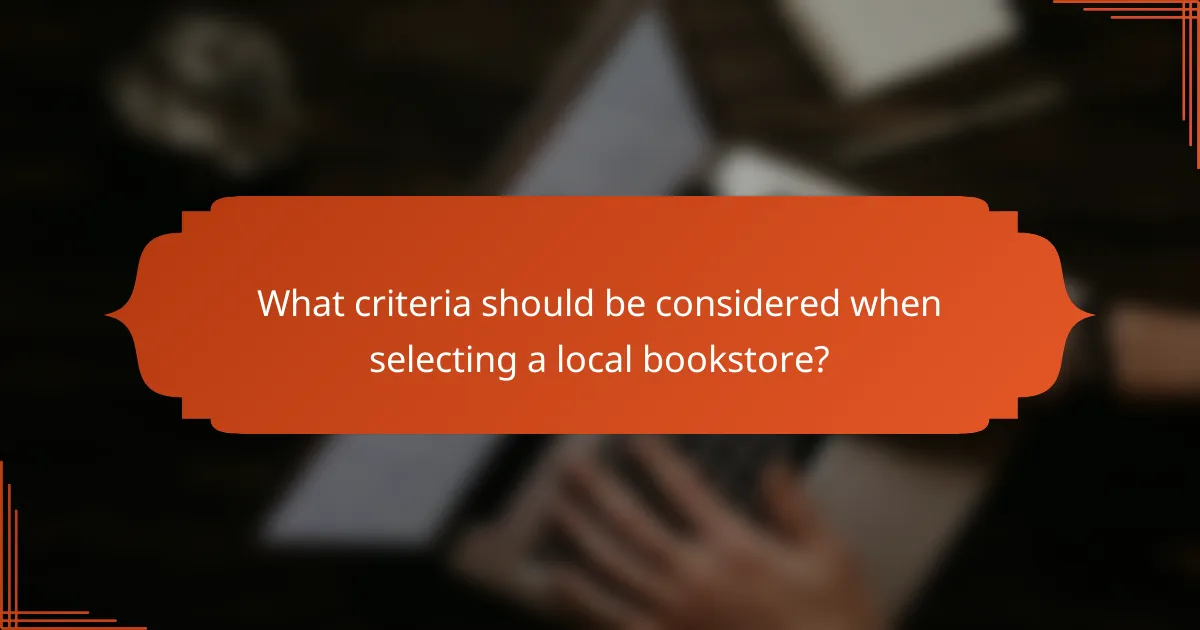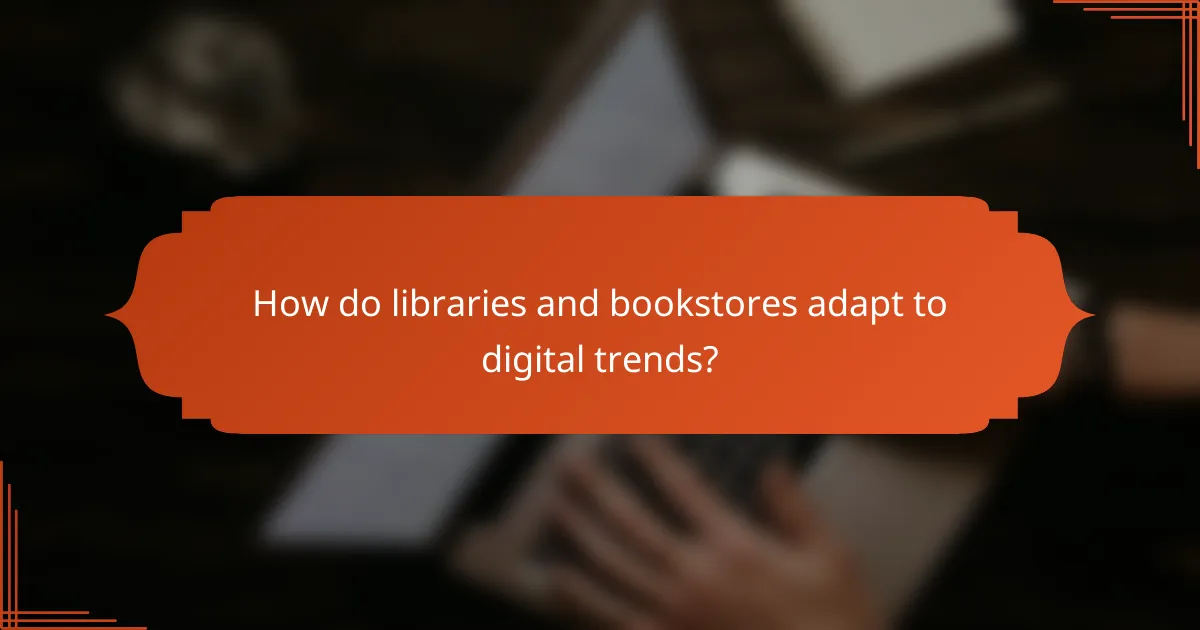Libraries and bookstores serve as vital resources for communities, enhancing access to literature and supporting local authors. By providing free services and promoting diverse collections, libraries ensure that everyone can engage with books, while bookstores create platforms for authors to connect with readers. Together, these institutions can foster community engagement through collaborative initiatives that promote literacy and cultural enrichment.

How do libraries support access to books in urban areas?
Libraries enhance access to books in urban areas by providing free resources and services that cater to diverse communities. They offer physical and digital collections, ensuring that residents can find and borrow materials that meet their needs.
Public library systems
Public library systems serve as vital hubs in urban areas, offering a wide range of books, magazines, and multimedia resources. These libraries often have multiple branches, making it easier for residents to access materials close to home. Many libraries also provide programs and events that promote literacy and community engagement.
In addition to traditional lending, public libraries frequently offer services such as interlibrary loans, allowing patrons to borrow books from other branches. This expands the available selection significantly, often including rare or specialized titles.
Digital lending platforms
Digital lending platforms have transformed how urban residents access books by allowing them to borrow e-books and audiobooks from the comfort of their homes. Services like OverDrive and Libby enable users to check out digital titles using their library card, often with a user-friendly app interface.
These platforms typically offer a vast selection of genres and formats, catering to various interests. However, users should be aware that availability may vary, as popular titles can have waitlists, similar to physical copies.
Community outreach programs
Community outreach programs are essential for libraries to connect with underserved populations in urban areas. These initiatives often include mobile library services, literacy workshops, and partnerships with local organizations to promote reading and education.
By actively engaging with the community, libraries can address specific needs and barriers to access. For example, programs targeting non-English speakers or low-income families can provide tailored resources and support, ensuring that all residents have the opportunity to benefit from library services.

What role do bookstores play in promoting local authors?
Bookstores play a crucial role in promoting local authors by providing visibility and access to their works. They create platforms for engagement, allowing authors to connect with readers and build a community around their books.
Author signing events
Author signing events are a popular way for bookstores to promote local authors. These events allow authors to meet their readers, sign copies of their books, and share insights about their writing process. Bookstores often schedule these events during weekends or holidays to maximize attendance.
To organize a successful signing event, bookstores should consider promoting it through social media, local press, and community boards. Offering refreshments or themed decorations can also enhance the experience and draw in more attendees.
Local author showcases
Local author showcases highlight multiple authors in a single event, allowing readers to discover a variety of local talent. These showcases often feature readings, panel discussions, and Q&A sessions, creating an interactive experience for attendees.
Bookstores can host these showcases quarterly or biannually, featuring different genres each time. Collaborating with local literary organizations can help in curating a diverse lineup and attracting a wider audience.

How can libraries and bookstores collaborate for community engagement?
Libraries and bookstores can collaborate effectively to enhance community engagement by organizing joint initiatives that promote literacy and cultural activities. These partnerships can leverage each entity’s strengths to create a more vibrant community space.
Joint events and workshops
Joint events and workshops can serve as powerful tools for libraries and bookstores to engage the community. Examples include author readings, book signings, and educational workshops on various topics such as writing, digital literacy, or local history.
When planning these events, consider scheduling them during peak community times, such as weekends or evenings, to maximize attendance. Collaborating on logistics, such as venue setup and marketing, can streamline the process and reduce costs.
Shared promotional campaigns
Shared promotional campaigns can amplify the reach of both libraries and bookstores, attracting more visitors and participants. This can include co-branded social media posts, joint newsletters, or community flyers that highlight upcoming events and special offers.
To ensure effectiveness, align the messaging and branding of both entities. Utilize local channels, such as community boards or local media, to spread the word. Regularly assessing the campaign’s impact can help refine future efforts and ensure they resonate with the community.

What are the benefits of library membership for e-commerce users?
Library membership offers e-commerce users access to a variety of digital resources and discounts that enhance their shopping experience. Members can utilize exclusive online databases and receive special offers at local bookstores, making it a practical choice for avid readers and shoppers alike.
Access to exclusive digital resources
Library members often gain access to a range of digital resources, including e-books, audiobooks, and online databases. These resources can be accessed from anywhere, allowing users to read or listen to content without needing to visit a physical location.
Many libraries partner with platforms like OverDrive or Libby, enabling members to borrow digital titles for free. This can save e-commerce users significant amounts of money, as they can enjoy a wide selection of literature without purchasing each title.
Discounts on local bookstore purchases
Library membership frequently includes discounts at local bookstores, encouraging community engagement and supporting local businesses. These discounts can range from 10% to 20% off regular prices, making it more affordable for members to buy books.
Additionally, some libraries host events or partnerships with bookstores that provide exclusive promotions for members. This not only enhances the value of library membership but also fosters a vibrant local reading culture.

How do libraries enhance literacy programs in schools?
Libraries play a crucial role in enhancing literacy programs in schools by providing access to a wide range of reading materials and resources. They support educators and students through collaborative initiatives that promote reading and comprehension skills.
Partnerships with local schools
Libraries often establish partnerships with local schools to create tailored literacy programs that meet the specific needs of students. These collaborations can include joint events, workshops, and resource sharing, allowing schools to leverage library materials and expertise.
For example, a library might work with a school to develop a summer reading challenge, encouraging students to read a certain number of books and rewarding them with prizes. Such initiatives can significantly boost student engagement and foster a love for reading.
After-school reading programs
After-school reading programs hosted by libraries provide students with additional opportunities to improve their literacy skills in a supportive environment. These programs often include guided reading sessions, storytelling, and interactive activities designed to make reading enjoyable.
Typically, these programs are free or low-cost, making them accessible to a wide range of families. Libraries may also offer incentives, such as book giveaways or certificates, to motivate students to participate and achieve their reading goals.

What criteria should be considered when selecting a local bookstore?
When selecting a local bookstore, consider factors such as inventory diversity, community involvement, and customer service. These elements significantly influence the overall shopping experience and the store’s role in the local community.
Inventory diversity
Inventory diversity refers to the range of genres, authors, and formats available at a bookstore. A well-stocked store should offer a mix of bestsellers, classics, niche titles, and local authors, catering to various reading preferences.
When evaluating a bookstore’s inventory, look for sections dedicated to different genres, including fiction, non-fiction, children’s books, and graphic novels. A diverse inventory not only enhances your reading options but also supports a broader literary community.
Community involvement
Community involvement is a key indicator of a bookstore’s commitment to its local area. Bookstores that host events, such as author readings, book clubs, and workshops, foster a sense of community and encourage engagement among readers.
Check if the bookstore collaborates with local schools, libraries, or charities. Such partnerships often lead to initiatives that promote literacy and provide access to books for underserved populations, enhancing the bookstore’s role as a community hub.

How do libraries and bookstores adapt to digital trends?
Libraries and bookstores are increasingly embracing digital trends to enhance access and engagement. By integrating technology, they provide users with improved services and innovative ways to connect with literature.
Online catalog systems
Online catalog systems allow libraries and bookstores to offer users easy access to their collections from anywhere. These systems typically feature search functionalities that enable patrons to find books by title, author, or subject, streamlining the borrowing or purchasing process.
Many libraries utilize integrated library systems (ILS) that manage inventory, track loans, and facilitate reservations. Bookstores may adopt similar platforms to manage stock and provide real-time availability, enhancing customer experience.
Virtual author events
Virtual author events have become a popular way for libraries and bookstores to engage audiences without geographical limitations. These events often include live readings, Q&A sessions, and discussions, allowing readers to interact with authors directly from their homes.
To host a successful virtual event, consider using platforms like Zoom or Facebook Live. Promote the event through social media and email newsletters to maximize attendance. Offering recordings afterward can also help reach those who couldn’t attend live.
